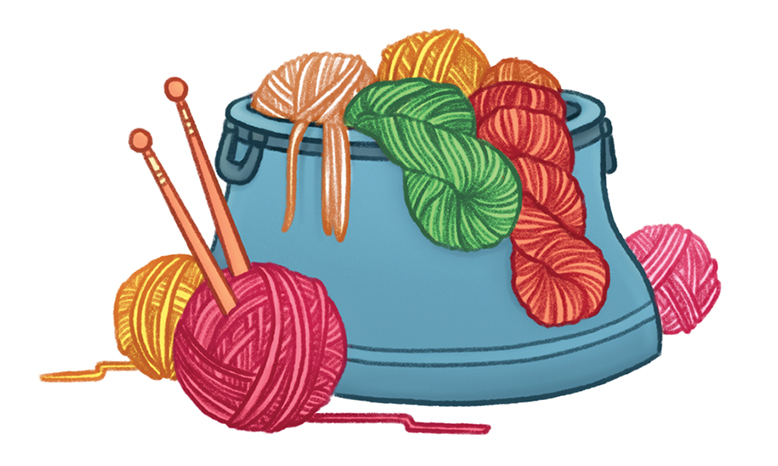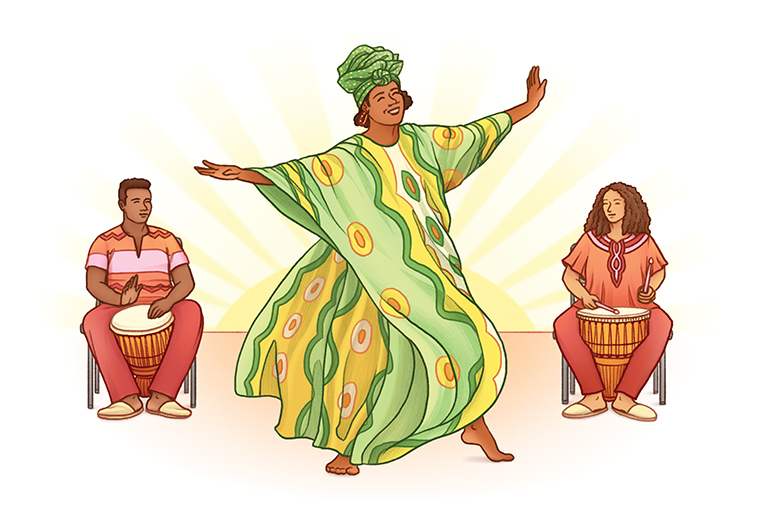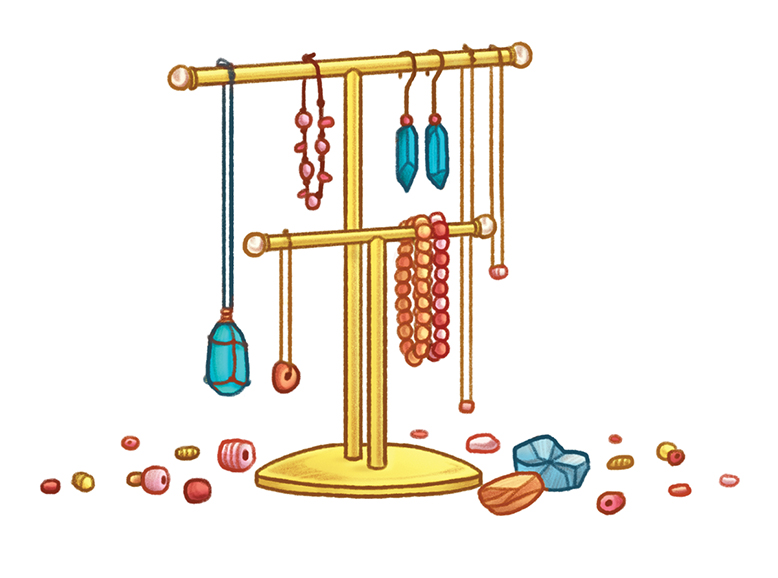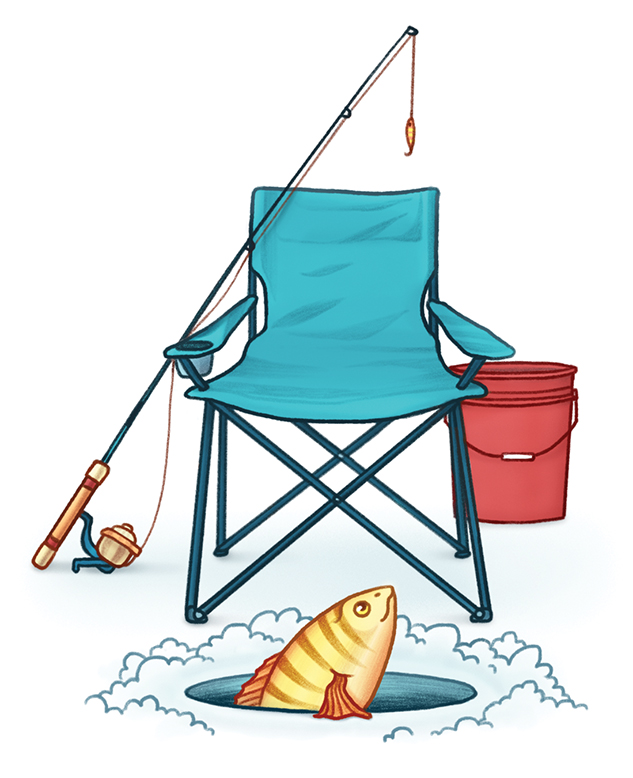
Tired of the stay-at-home routine? Brighten your outlook with one of these locally based, mostly virtual classes.
Learn to Sing
Tim Welch Vocal Studio, Vauxhall
♦ 30-minute Zoom lesson
♦ Fee: $50
Singing, Brian Wiseman will tell you, starts not in the vocal cords or the chest but below the bellybutton. When you distend your abdomen, you draw in air like a bellows. As Wiseman, a very encouraging teacher at the Tim Welch Vocal Studio, puts it, “the stomach is the driver of the sound.” In person or on Zoom, he will start you on voice calisthenics, including one variously called “creaking door” and “vocal fry” (like an extended croak) that strengthen the vocal cords. Even on your first lesson you’ll get to pick a song or two, in whatever genres appeal to you, and begin to tackle them. I chose the Beatles tune “I’ll Cry Instead” and, a monumental challenge, “Somewhere Over the Rainbow.” It was fun, but don’t be surprised if, like me, you’re tired afterward. “When you sing,” Wiseman explains, “a thousand things are happening in your brain at once. Somebody once said you shouldn’t drive a car for 30 minutes after a voice lesson, because your brain is firing on all different levels. You need to relax a little.”—Eric Levin
Wine 101: New World Versus Old World
Amanti Vino
♦ January 9, 4 pm; 1 hour
♦ Fee: $99.99 (includes 3 bottles of wine)
Sharon Sevrens, owner of this Morristown and Montclair wine shop, facilitates more than a half-dozen wine-related courses for all knowledge levels. This virtual course offers a solid foundation in understanding varietals and the impact on wine of various factors, including climate, soil and region. The tasting wines can be picked up curbside or delivered. After the instruction, Sevrens fields questions from the class. Classes are live via Zoom and recorded so participants can also watch at a later date. Other upcoming classes include the Deep Dive Series (January 23, 4 pm; $135), which introduces less commonly known varietals, and Master Class: Burgundy of France! (February 6, 4 pm, $250), which focuses on a famed region for wine production.—Deborah P. Carter

Illustration by Hannah Agosta
Cross Country Skiing
High Point Cross Country Ski Center
♦ Route 23, Sussex
♦ Fee: Adult group lessons, $23; private lessons, $34
Hans Karlsen knows a thing or two about cross-country skiing. Karlsen learned the sport in his native Norway, where cross-country is a way of life. Since 1996, Karlsen has owned and operated High Point Cross Country Ski Center, a winter wonderland of stunning vistas in the state’s northwest corner. It has become the epicenter of the sport in New Jersey. Here, you can ski on your own, or take individual or group lessons from Karlsen’s team.
“It’s the best location in the state due to the colder temperatures and more snow,” Karlsen says. The center operates on state land—1,600 feet above sea level—under contract with the New Jersey Department of Environmental Protection.
Although not as popular as downhill (or Alpine) skiing and snowboarding, cross-country offers many advantages. “The sport exercises the entire body and involves fresh air, low cost, and the ability to enjoy wildlife, family and friends,” Karlsen says. What’s more, the boots are more comfortable and there are no chilly rides up wind-blown lifts—or long lift lines for that matter. Cross-country lets you explore new trails over large expanses of forest. And social distancing comes naturally in the open air.
Learning is also easier. “I would agree with those who say, ‘if you can walk you can cross country ski,’” Karlsen says.
About 25 percent of High Point visitors take lessons. Beginner lessons start with getting people comfortable on skis. “Some people are slow, going one step at at time, at first,” Karlsen says. “If they are wobbly and fall over we teach them methods to get back up.” Once they have a degree of comfort, beginners learn the skating and gliding motions of cross-country.
The most difficult part of cross-country is navigating hills. Similar to Alpine skiing, cross-country skiers are taught to control downhill speeds by turning their skis inward into a snowplow or pizza position. To go uphill, they learn the opposite, turning their skis outward—“for traction and to prevent from falling backwards,” Karlsen explains.
In addition to providing lessons, High Point rents skis, poles and boots. The staff can also coach you on the correct clothing for warmth and comfort.
Melissa Fischer of Branchville and her husband, Dave, gave cross-country a try without a lesson last winter at High Point and had a blast. “It’s easy to rent equipment, and the trails are great for beginners,” she says.
As for safety, High Point has 35 ski patrollers who are trained to react to medical emergencies—which are rare—and provide other assistance, such as updates on trail conditions. “We also get the pleasure of seeing and speaking to the many repeat visitors who come back year after year,” says Stu Mavros, a patrol representative and director at High Point.
Joni Hamilton Porter, another High Point patroller, likes the atmosphere Karlsen has created. “The way that Hans has the lodge set up feels like a bit of Norway,” says Porter. “There’s a fire burning and it’s decked out with Norwegian décor.”
The first few seasons the center was open, Karlsen attempted snow making. Given New Jersey’s fickle winter weather, he plans to use snowmaking equipment again this year and spread the man-made white stuff on the High Point trails.
“It’s a gamble and depends on the temperatures,” Karlsen says. “We’re going to try it again this season.”—Laurie Gordon

Illustration by Hannah Agosta
Virtual Cooking
Little Fox Kitchen, Cranford
♦ 90-minute Zoom classes
♦ Fee: $48–$58; with kit, $85–$100
At the beginning of the pandemic, the culinary event space Little Fox Kitchen moved all cooking and baking classes online, outfitting the facility with cameras that allow up-close instruction every step of the way, from prepping ingredients at the cutting board to cooking at the stove or mixer, and then plating. Students learn how to cook savory dishes like mushroom risotto, focaccia or gnocchi with arugula pesto, as well as sweets like biscotti, English tea scones and tarte Tatin. You must provide your own fresh perishable ingredients. Some classes come with the option to purchase a kit that’s shipped to your home. These include pre-portioned non-perishable ingredients and kitchen staples like a wooden gnocchi board for the gnocchi class, or porcelain French soufflé dishes for the chocolate soufflé class.—Shelby Vittek

Illustration by Hannah Agosta
Red, Yellow and Purple: Using Historic Natural Dye on Wool
Peters Valley School of Craft, Layton
♦ Two sessions: February 6 & 13
♦ Fee: $100
The hands-on virtual workshops offered through Peters Valley are for committed crafters. “A lot of the classes have a component when you’re working on your own in between sessions,” says education director Jennifer Apgar. This upcoming course led by weaver Wendy Weiss is no exception. Weiss will explain the art and history of dyeing wool with plant dyes over two 1-½ hour virtual instructional sessions via Zoom. Between classes, students will work independently daily to prep the fiber, a time-consuming process. Want more? Cabinet of Paper Curiosities led by Shawn Sheehy takes place on January 9–10 and 16–17 (tuition, $400). During these four classes (six hours per weekend) students create various pop-up book mechanisms. For both courses, materials are provided and beginners are welcome. Peters Valley hopes to offer in-person classes starting in May.—Jacqueline Klecak
Mah Jongg Basics
Kaplen JCC on the Palisades
♦ Five 2-hour sessions
♦ $165–$185
Learn how to play the American version of Mah Jongg, a popular Chinese tile game, from master Stacy Budkofsky. For the past 15 years, Budkofsky has taught “elementary school kids all the way up to a 97-year-old.” The classes are taught virtually (iPad or computer required), through an interactive program from the School of American Mah Jongg. Using the program, Budkofsky can see students’ tiles, allowing her to guide each player in real time. Four players are required, making this a perfect opportunity to reconnect with friends from whom you’ve had to social distance for far too long. Beginner, intermediate and advanced classes are available. Call 201-408-1456 to register.—Shelby Vittek

Illustration by Hannah Agosta
Making Fine Art in the 21st Century
Center for Contemporary Art, Bedminster
♦ Five Saturdays starting January 16
♦ Fee: $162 (nonmembers), $137 (members)
“The thing with digital art is that there are no limitations,” says Jeremie Duval, who teaches students of all ages to make art on their iPad using Procreate. “You have all the paintbrushes you can imagine, have all the colors. It’s just a very diverse place that you can go with this very simple $10 app.” Artists can use Procreate to create drawings, animation and other art pieces. No level of skill is specified, but students have to be serious about learning. Ideally, Duval says, students will watch the Zoom class on a computer while drawing on an iPad with an Apple Pencil, a pressure-sensitive device that feels like a real pencil or brush. “The idea is to take away the barrier of the technology, the fear of the technology, and just create for the art’s sake.” The Center for Contemporary Art—which celebrated its 60th anniversary in 2020—also offers virtual classes in drawing, painting, sculpture and other media for children and adults.—Marlaina Cockcroft
Quilting—Saturday Sampler Club
Pennington Quilt Works
♦ Monthly starting in February
♦ Fee: $30–$36
Create an heirloom-quality quilt with step-by-step instruction. This class—open to all skill levels—teaches participants to create a new quilt block each month for six months. Owner Jan Crane creates the monthly videos for the class, which pre-Covid-19 was a year-long project that often drew more than 100 patrons to the store. After the initial payment, participants who complete their monthly quilt block, receive the next month’s fabric and instructions (a $6 value) for free. “We work on the honor system with side-door pick up,” Crane says. “I’m very proud of my customers.” Also available: Additional color combinations ($6) and a kit to finish the blocks into a quilt ($30-$90). Pennington offers numerous other fabric and paper-art classes.—Deborah P. Carter
Guided Beer Brewing
Fermented Food & Beverage Supply
♦ One 3-hour session, one 1-hour session
♦ Fee: $40, plus supplies
It’s easy to crack open a bottle of beer without pondering the malted grains, hops, yeasts and skill that make it possible. Fermented Food & Beverage Supply can fix that. The Hammonton shop sells equipment and ingredients for making beer, wine, cheese, kombucha, yogurt—virtually anything fermented. In the back of the store, owner Eric Schmehl typically teaches classes on how to make the different edibles and potables. The pandemic has pared down his class list to beer-brewing—taught in one-on-one sessions.
When I arrived at Fermented, Schmehl had laid out a table with lab-worthy contraptions, plus containers of grains and packets of yeast and hops. His original recipe and instructions for the hazy IPA I requested was printed out, with space for note-taking.
At its core, brewing is a science, and I am no scientist. But Schmehl, an avid brewer, spent the first part of the session describing the process in detail and helped every step of the way, making sure I could recreate the process in the future—scientist or not.
First, we converted the starches in our malted grains into sugar by heating and steeping them in Schmehl’s small electric brewer, a device that would easliy fit in any garage. Once we strained out the grain, we were left with a blank-canvas of golden-liquid to flavor with hops. We added the first round in small increments while the beer-to-be (called wort) was still hot. Next, we cooled the wort and transferred it into a large, plastic jug in which the beer could ferment. The next addition was the star of the show, the yeast, which we poured in about three hours after I had arrived. When the jug was sealed tight, we were done for the day.
Schmehl kept the fermentation jug temperature controlled at the shop in my absence, and tracked its progress over about a week. I returned to the shop when our brew was ready to be bottled. We set up an assembly-like production line to bottle and cap the beer, and after about an hour I left with two cases (50 bottles) of my custom brew.
As instructed, we patiently waited five days to sample the IPA. Expecting something amateurish, I was pleasantly surprised by the final product, which was excellently carbonated and refreshing. I can’t wait to make the next batch. To schedule: fermentednj.com.—Shea Swenson
Kickboxing
Brach’s MMA, Voorhees
♦ Tuesdays & Thursdays, 6–7 pm; Saturdays, 10–11 am
♦ Fee: $105 per month
In kickboxing, timing is everything. Timing your moves in and out of an opponent’s reach keeps the opponent guessing. Move too slow and you open yourself up to getting hit. I learned my moves with live classes in hopes of staying sharp and physically fit while otherwise sheltering at home. “Our workout is for anybody,” says Kenny Brach, owner of Brach’s MMA. “Our programs are geared for someone who just wants to get in shape, or someone who wants to learn self-defense.” Brach offers in-person classes in Brazilian Jiu-Jitsu, Korean Karate and American Kickboxing I trained in kickboxing, which focuses on evading your opponent’s attacks, and striking with punches or kicks when necessary. Once you learn the basic footwork and techniques, sparring is where you are really tested—and good timing becomes all the more essential. Concerned about a live workout? All mats and equipment are sanitized prior to training sessions, and sparring partners are masked. For video instruction, you can opt for MMA Academy Online. Access to the course is $7 a month or $60 annually. In addition to cardio and other fitness benefits, martial arts can offer stress relief. “When you come in here for class, for that hour,” says Brach, “you forget about everything outside.”—Royal Thomas II

Illustration by Hannah Agosta
Cake Decorating
Splurge Bakery, Millburn
♦ Variety of class options
♦ Fee: $55
With all that home baking you’ve been doing during the pandemic, it’s time to make your cakes look as good as they taste. Splurge Bakery’s one-hour class will transform your buttercream skills and turn you into a decorating pro. Learn how to ice a cake properly, pipe roses and create other sweet decorations. They offer cake-decorating kits that include all of the materials so you can learn via Zoom at home, or starting in March, classes will be offered outside on their backyard deck. Splurge also offers cupcake decorating and snickerdoodle kits for kids, along with virtual classes on bread baking and how to make pasta dinners with different sauces and garlic bread.—Molly Gregor
Podcast Like a Pro
Montclair Film
♦ Five Tuesdays, 7–9 pm, starting February 16
♦ Fee: $220, or $198 for members
Podcasting was big even before the pandemic. These days, our hunger to tell and hear riveting stories is much the same, says producer Frank Hablawi, instructor for Montclair Film’s podcast workshop this winter. Learn how to develop your own season of episodes, from pitching an idea all the way through mixing and post-production. The computer microphone you use for the virtual class is the only equipment you’ll need. Beginners and podcast enthusiasts are welcome. Montclair Film also offers courses in screenwriting, voice acting and video editing. Information: montclairfilm.org/education or email [email protected].—Jennifer Finn
Shoemaking
RoxAnneLava
♦ One 3-hour Zoom class
♦ Fee: $250
Make your own pair of fashionable mules with shoe designer RoxAnn. The first step is fashioning your own unique design by ordering and selecting your style, your size and the material for the upper part of the mule. Once you receive these materials at home, you can make your own fully wearable pair of shoes via online instruction. In the class, you’ll learn how to fit the upper to the bottom and finish the details. You’ll leave with a basic understanding of shoemaking and a unique pair ready to wear within 24 hours. No prior experience is necessary.—Molly Gregor

Illustration by Hannah Agosta
West African Dance
Umoja Dance Company
♦ Once a month
♦ Fee: $15
Multitaskers, this is your class. Whether you are well versed in West African cultural traditions or don’t know the difference between a congo beat and a conga line, Umoja aims to reach you spiritually as well as physically with this series of hour-long, virtual throwdowns taught by guest instructors. Think of it as church on the dancefloor: Between leaping, striding, shuffling and flinging your arms around with the teacher in your at-home dance circle, you learn the meaning behind the monthly dance. One session may connect you with the harvest gods, another with the energy to heal yourself. Either way, expect to commune with the West African village vibe, and most definitely the rhythm. The studio also offers classes in Capoeira, ballet/jazz combo, modern/jazz and more. (No in-studio options during the pandemic.)—Tammy La Gorce
Photoshop Deep Dive
Unique Photo, Fairfield
♦ Five Wednesdays starting January 13, 5:30–7 pm
♦ Fee: $295
Most of the students in this class—moving from in-person to Zoom for the first time—are amateur photographers who are intimidated by Photoshop or have started using it but want to add to their skills, says instructor Blake Taylor. Using Photoshop, Taylor says, “You’re trying to bring out details within that good photograph.” For example, you can enhance the sky or the field in a landscape shot. Students are surprised at how much they can do with an image, Taylor says. “On one hand, it’s a real simple program, and on the other, it’s an extremely complex program.” Taylor aims to provide the knowledge students need. “I have people from five years ago who email me questions about Photoshop today,” he says. Unique Photo offers numerous classes in photography and camera tips for beginners to professionals.—Marlaina Cockcroft
Virtual Cocktails
Laylow, Asbury Park
♦ 60–75-minute session
♦ $10, plus ingredients
When the pandemic put a temporary end to nightlife last spring, the cocktail lounge Laylow found a new way to share its artistry with guests. Starting in March, each Wednesday at 7 p.m., bartenders have logged in to Zoom from behind the bar to teach cocktail enthusiasts and mixology novices to shake up professional-grade drinks in their own homes. Before each class, the bartenders provide a list of syrups, cordials, spirits and any other ingredients for the week’s creations. Each class includes three unique drinks, themed to reflect the season. Attendance runs from 30–100 people; attendees can toast each other as well the bartenders. For a more personalized experience, Laylow offers private virtual classes. Sign up: laylowap.com.—Shea Swenson

Illustration by Hannah Agosta
Jewelry Making
Kulicke Jewelry School, Wayne
♦ Four 3-hour classes
♦ Fee: $400
Rest assured you won’t be stringing beads at goldsmith Fredericka Kulicke’s in-person, hands-on workshops. Instead, you will learn the ancient art of jewelry-making and will create pieces in silver, gold, gemstones and enamel. Current workshops are held on Tuesdays and are limited to just four people (reduced from the normal eight) as Kulicke shares her knowledge of goldsmithing techniques and skills. Additional supplies—including silver, a sketch pad and pencils, paint brushes and hand tools—are required before the first class. Beginners are welcome.—Molly Gregor

Illustration by Hannah Agosta
Guided Ice Fishing
Lazy K Ranch
♦ Five-hour lessons; up to four people
♦ Fee: $250
Chris Kuhn and his team teach beginners how to ice fish, and the best part is all equipment is provided. Chairs and gear will be waiting, and there are pop-up shelters for exceptionally cold days. Participants are shown how to set up gear and are walked through the fine points of ice fishing. Holes are drilled for you and gadgets called tip ups indicate when there’s a fish on the line. The team even provides hot dogs on the grill. All you need is a state fishing license—and for the lakes to freeze over. The trips—roughly from December through February—venture to Lake Hopatcong, Swartswood Lake, Lake Aeroflex and White Lake; catches include land-locked salmon and bass. If it gets cold enough, folks also fish on Assunppink Lake in Monmouth County.—Laurie Gordon
